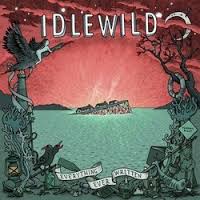Idlewild have been a band for twenty years now, and doesn’t it show. The blood-rush riots that passed as early gigs have slipped beneath tangible memory to become simply a feeling, a wisp on a wind that becomes a whole only when stirred by a revisit to Hope Is Important. The manoeuvres that took the Scots from scrappy punks who could barely play to sensible-shoed R.E.M. analogues, encapsulated in the 2002 album The Remote Part, have had their tyre tracks followed ever since – and Everything Ever Written, the group’s first LP since 2009’s Post Electric Blues, makes no dramatic move through the gears.
This is mostly Idlewild on auto-pilot, then: dependable, melodically sound, slightly maudlin, sometimes sprightly – but more like an uncle on the punch than a toxic crusader pissing his night up the wall after sinking a half-dozen snakebites in the SU of the university he’ll soon enough drop out of. But that’s not a bad thing, as such – rather a comeback that ticks all the boxes amongst a fanbase that’s still sticking in there than a radical revision of everything that’s been, to the detriment of the band’s reputation. And it’s not like Everything Ever Written ever flirts with alienating the listener through over-familiarity; the wordplay of frontman Roddy Woomble will forever fascinate, even if the heat of the riffs around it has cooled.
Woomble never was a lyricist of conceptual depth, preferring to contrast lines for feeling, for flow and the way that they rolled the tongue, rather than to deliver a sermon-like message to his congregation. Here, he’s revelling still in his role as assembler of memorable lines that don’t necessarily resonate with great weight, peppering songs like ‘Nothing I Can Do About It’ and ‘On Another Planet’ with bright choruses that don’t require a second invitation to implant themselves in the grey matter. "Everything’s passing away," he states on the latter, before moving onto saying that we’ve "more in common than sorrow" and hitting a chorus that doesn’t wholly join the dots he’s laid out for himself.
The connective tissue between standout lines can seem stretched, then, but when Woomble finds arresting imagery, he runs with it. ‘Come On Ghost’ is a case in point: "Come on, ghost, give me back the key / Unlock the door and you’re never gonna find me / I can see through you, and you can see through me." It’s clear language, easy metaphorical material – but what it’s saying precisely gets lost in the delivery, somewhere. Said song’s instrumental coda is an early highlight of this set, though, clattering brass against squealing guitars; and the following ‘So Many Things To Decide’ arrives on scratchy violin strings.
The folk footsteps that Woomble’s walked on his solo material are retraced on a few numbers here – ‘So Many Things…’ the first of them to appear, albeit buoyed beyond strum-along predictability by warm and rich organ tones. ‘Like A Clown’ is built atop an acoustic base, its dalliances with amplification only ever modest – something that you’d never have seen coming if your entire understanding of this band was formed from the turbulence of 100 Broken Windows.
The sole surprise package is delivered last, as ‘Utopia’ takes the form of a delicate but far from forlorn piano ballad. It’s a genuinely beautiful love song in this bare-bones guise – the band has a bigger, ‘full-band’ version, but my advice would be to leave that in the private archive. A couple of listens later and you start to wonder what someone like Adele might make of such a song. Stick some Hollywood strings on there, record the vocals with the best microphone an Academy Award can buy: number one with a bullet, probably.
Everything Ever Written is a welcome return for a band that’s long been held in high regard. It’s not about to displace any long-term fan’s favourite from its position, but it’s definitely not the embarrassment that many a comeback collection has proven to be. Just as The Charlatans’ Modern Nature managed a few weeks ago, Idlewild’s seventh LP proper offers evidence enough of still-relevant creativity at play from musicians whose breakthrough came entire decades ago. Their age is showing, sure, and their bones aren’t so ready to rock – but their commitment and acumen is palpable, even when the arrangements come at a relative canter.
<div class="fb-comments" data-href="http://thequietus.com/articles/17193-idlewild-everything-ever-written-review” data-width="550">


